Class XII (Vistas) Chapter - 2 'The Tiger King'
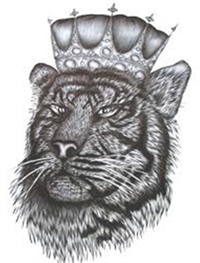
The Tiger King
By Kalki
About the author
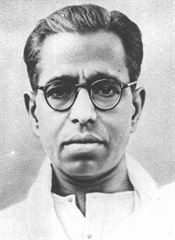
Ramaswamy Aiyer Krishnamurthy
9 September 1899 – 5 December 1954
Pen name ‘Kalki’
9 September 1899 – 5 December 1954
Pen name ‘Kalki’
Ramaswamy Aiyer Krishnamurthy was a Tamil writer, journalist, poet, critic and Indian Independence activist. He penned 120 short stories, 10 novelettes, 5 novels, 3 historical romances, editorial and political writings and hundreds of film and music reviews.
Introduction to the lesson
The story ‘The Tiger King’ is a satire on the pride and stubbornness of those in power. The writer takes us to the days of autocratic and eccentric kings. These kings lived under the thumb rule of British, hence they fear them. Most of the time the rulers were not interested in serving the people and working for the welfare of the public; instead they spent their time in foolish pursuits. They flouted all laws and bent them to suit their selfish interests. The Maharaja of Pratibandapuram tried to belie what was written in his fate. The chief astrologer had predicted that the cause of his death would be a tiger. The King tried his best to belie the prediction. His campaign of tiger-hunting was very successful. All his strategies and wise plans worked till he killed 99 tigers. But the hundredth tiger eluded him till his death. The irony of fate brings quite an unexpected end of the Maharaja. The hero who killed ninety nine tigers couldn’t kill the only one that was left. The last tiger he thought to be dead survived. The King’s bullet had missed its mark. Ironically, the hundredth tiger which caused his death was not a ferocious beast of blood and flesh. It was a wooden tiger. One of the slivers of wood pierced his right hand and caused infection and a suppurating sore. It ultimately led to his death.
Theme
Animals and birds are as much part of the nature as human beings. The destruction or haphazard killing of one species may not only lead to its extinction, but it will adversely affect the ecological balance. Those animals which serve as food for the wild animals, will increase in large number, if the beast of prey are wiped out. Each species, howsoever fierce, deadly, ferocious or poisonous has its role in maintaining ecological balance in nature.
Characters
- The Tiger King: a hero of the story, the Maharaja of Pratibandhpuram, also known as His Highness Jamedar, General Khiledar-Major, Sata-Vyaghra samhari, Maharajadhiraja Visva Bhuvana samrat, Sir Jilani Jung Jung Bahadur, M.A.D., A.C.T.C., or C.R.C.K.
- Crown prince: a ten day old baby who later became the Maharaja of Pratibandhpuram.
- Chief astrologer: a royal foreteller of the state.
- Durai: means “chief, leader” in Tamil.
- A British high ranking officer & his secretary
- Dewan: a chief administrative office of the Maharaja.
- Duraisani: the wife of the high ranking British officer, a greedy woman who takes all the 50 or so diamond rings for herself.
Summary –
The tiger King is the story of king Jung Jung Bahadur of Pratibandapuram, a brave warrior whose death had been predicted when he was born. The chief astrologer had predicted as the royal child was born in the hour of the bull, the tiger being its enemy, death would come to the child by a tiger. The brave prince asked all tigers to beware of him. He came to be known as ‘tiger king’.
The prince became king at the age of twenty and considering killing a cow in self defense to be lawful, went on a tiger killing spree. He was warned of danger from the hundredth tiger that he encountered. As all the tigers in his kingdom had been killed by him but still he had to kill more, he married into a state having a high population of tigers.
When his killings reached ninety nine, he desperately sought the next hunt. Fearing the king’s harshness, the minister planted an old tiger in the forest for him to kill. The king fired at it but the tiger escaped the bullet miraculously. The royal hunters feared the king and so did not inform him; rather they killed the beast themselves.
The king was satisfied that he had evaded death and now celebrated his son’s third birthday. He got a wooden toy tiger as a gift for the prince. Although it was poorly done, the shopkeeper, fearing punishment under the rules of emergency charged a high price. As both the king and his son were playing with the tiger, one of the thin pieces of wood that were erupting out of the wooden tiger like feathers pierced the king’s right hand.
The wound became infectious, spread through his arm and as he was being operated upon, he died.
So, ironically, the hundredth tiger killed the king and eventually took its revenge.
Lesson TEXT & WORD MEANING
THE Maharaja of Pratibandapuram is the hero of this story. He may be identified as His Highness Jamedar-General, Khiledar-Major, Sata Vyaghra Samhari, Maharajadhiraja Visva Bhuvana Samrat, Sir Jilani Jung Jung Bahadur, M.A.D., A.C.T.C., or C.R.C.K. But this name is often shortened to the Tiger King.

i have come forward to tell you why he came to be known as Tiger King. I have no intention of pretending to advance only to end in a strategic withdrawal. Even the threat of a Stuka bomber will not throw me off track. The Stuka, if it likes, can beat a hasty retreat from my story.
Pretending: behaving so as to make it appear that something is the case when in fact it is not
Strategic: calculated
Stuka bomber: a German bomber aircraft that was used in the second world war
Right at the start, it is imperative to disclose a matter of vital importance about the Tiger King. Everyone who reads of him will experience the natural desire to meet a man of his indomitable courage face-to-face. But there is no chance of its fulfillment. As Bharata said to Rama about Dasaratha, the Tiger King has reached that final abode of all living creatures. In other words, the Tiger King is dead.
Indomitable: undefeatable
Final abode: refers to the final residence of the soul – the heaven.
The manner of his death is a matter of extraordinary interest. It can be revealed only at the end of the tale. The most fantastic aspect of his demise was that as soon as he was born, astrologers had foretold that one day the Tiger King would actually have to die.
Demise: death
Foretold: predicted
“The child will grow up to become the warrior of warriors, hero of heroes, champion of champions. But...” they bit their lips and swallowed hard. When compelled to continue, the astrologers came out with it. “This is a secret which should not be revealed at all. And yet we are forced to speak out. The child born under this star will one day have to meet its death.”
Compelled: forced
At that very moment a great miracle took place. An astonishing phrase emerged from the lips of the ten-day old Jilani Jung Jung Bahadur, “O wise prophets!’’
Everyone stood transfixed in stupefaction. They looked wildly at each other and blinked.
‘‘O wise prophets! It was I who spoke.’’
This time there were no grounds for doubt. It was the infant born just ten days ago who had enunciated the words so clearly.
The chief astrologer took off his spectacles and gazed intently at the baby.
‘‘All those who are born will one day have to die. We don’t need your predictions to know that. There would be some sense in it if you could tell us the manner of that death,’’ the royal infant uttered these words in his little squeaky voice.
Transfixed: cause (someone) to become motionless with horror, wonder, or astonishment.
Stupefaction: shock
Enunciated: say or pronounce clearly.
The chief astrologer placed his finger on his nose in wonder. A baby barely ten days old opens its lips in speech! Not only that, it also raises intelligent questions! Incredible! Rather like the bulletins issued by the war office, than facts.
The chief astrologer took his finger off his nose and fixed his eyes upon the little prince.
‘‘The prince was born in the hour of the Bull. The Bull and the Tiger are enemies, therefore, death comes from the Tiger,’’ he explained.
Incredible: unbelievable
You may think that crown prince Jung Jung Bahadur was thrown into a quake when he heard the word ‘Tiger’. That was exactly what did not happen. As soon as he heard it pronounced, the crown prince gave a deep growl. Terrifying words emerged from his lips.
‘‘Let tigers beware!’’
This account is only a rumour rife in Pratibandapuram. But with hindsight we may conclude it was based on some truth.
Rumour: a currently circulating story or report of uncertain or doubtful truth.
Rife: widespread, prevalent
Hindsight: to understand an event or situation only after it has happened
II
Crown prince Jung Jung Bahadur grew taller and stronger day by day. No other miracle marked his childhood days apart from the event already described.
The boy drank the milk of an English cow, was brought up by an English nanny, tutored in English by an
Englishman, saw nothing but English films — exactly as the crown princes of all the other Indian states did. When he came of age at twenty, the State, which had been with the Court of Wards until then, came into his hands.
Court of wards: The Court of Wards was a legal body created by the East India Company. Its purpose was to protect heirs and their estates when the heir was deemed to be a minor and therefore incapable of acting independently.
But everyone in the kingdom remembered the astrologer’s prediction. Many continued to discuss the matter. Slowly it came to the Maharaja’s ears.
There were innumerable forests in the Pratibandapuram State. They had tigers in them. The Maharaja knew the old saying, ‘You may kill even a cow in self-defence’. There could certainly be no objection to killing tigers in self-defence. The Maharaja started out on a tiger hunt.
The Maharaja was thrilled beyond measure when he killed his first tiger. He sent for the State astrologer and showed him the dead beast.
‘‘What do you say now?’’ he demanded.
‘‘Your majesty may kill ninety-nine tigers in exactly the same manner. But...’’ the astrologer drawled.
‘‘But what? Speak without fear.’’
“But you must be very careful with the hundredth tiger.’’
‘‘What if the hundredth tiger were also killed?’’
‘‘Then I will tear up all my books on astrology, set fire to them, and…’’
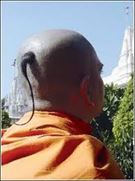
‘‘And…’’
‘‘I shall cut off my tuft, crop my hair short and become an insurance agent,’’ the astrologer finished on an incoherent note.
Tuft: a bunch or collection of threads, grass, hair, etc., held or growing together at the base.
Incoherent: unclear, confused
III
From that day onwards it was celebration time for all the tigers inhabiting Pratibandapuram.
The State banned tiger hunting by anyone except the Maharaja. A proclamation was issued to the effect that if anyone dared to fling so much as a stone at a tiger, all his wealth and property would be confiscated.
Proclamation: a public or official announcement
Fling: throw
Confiscated: taken with authority
The Maharaja vowed he would attend to all other matters only after killing the hundred tigers. Initially the king seemed well set to realise his ambition.
Ambition: a strong desire to do or achieve something.
Not that he faced no dangers. There were times when the bullet missed its mark, the tiger leapt upon him and he fought the beast with his bare hands. Each time it was the Maharaja who won.
Bare: here, unarmed
At another time he was in danger of losing his throne. A high-ranking British officer visited Pratibandapuram. He was very fond of hunting tigers. And fonder of being photographed with the tigers he had shot. As usual, he wished to hunt tigers in Pratibandapuram. But the Maharaja was firm in his resolve. He refused permission. ‘‘I can organise any other hunt. You may go on a boar hunt. You may conduct a mouse hunt. We are ready for a mosquito hunt. But tiger hunt! That’s impossible!’’
Firm: determined
Resolve: decision
Boar: pig
The British officer’s secretary sent word to the Maharaja through the dewan that the durai himself did not have to kill the tiger. The Maharaja could do the actual killing. What was important to the durai was a photograph of himself holding the gun and standing over the tiger’s carcass. But the Maharaja would not agree even to this proposal. If he relented now, what would he do if other British officers turned up for tiger hunts?
Durai: tamil word meaning chief or leader
Carcass: the dead body of an animal.
Relented: relaxed his decision
Because he prevented a British officer from fulfilling his desire, the Maharaja stood in danger of losing his kingdom itself.
The Maharaja and the dewan held deliberations over this issue. As a result, a telegram was despatched forthwith to a famous British company of jewellers in Calcutta. ‘Send samples of expensive diamond rings of different designs.’
Deliberations: discussions
Dispatched: sent
Some fifty rings arrived. The Maharaja sent the whole lot to the British officer’s good lady. The king and the minister expected the duraisani to choose one or two rings and send the rest back. Within no time at all the duraisani sent her reply: ‘Thank you very much for your gifts.’
Duraisani: Tamil word for wife of the chief.
In two days a bill for three lakh of rupees came from the British jewellers. The Maharaja was happy that though he had lost three lakh of rupees, he had managed to retain his kingdom.
IV

The Maharaja’s tiger hunts continued to be highly successful. Within ten years he was able to kill seventy tigers. And then, an unforeseen hurdle brought his mission to a standstill. The tiger population became extinct in the forests of Pratibandapuram. Who knows whether the tigers practised birth control or committed harakiri? Or simply ran away from the State because they desired to be shot by British hands alone?
Unforeseen: unplanned, accidental
Hurdle: problem
Standstill: stop
Extinct: having no living members.
Hara-kiri: a ritual of suicide practiced in Japan.
One day the Maharaja sent for the dewan. ‘‘Dewan saheb, aren’t you aware of the fact that thirty tigers still remain to be shot down by this gun of mine?’’ he asked brandishing his gun.

Brandishing: waving as a threat or in anger or excitement
Shuddering at the sight of the gun, the dewan cried out, ‘‘Your Majesty! I am not a tiger!’’
Shuddering: tremble with fear
‘‘Which idiot would call you a tiger?’’
“No, and I’m not a gun!’’
“You are neither tiger nor gun. Dewan saheb, I summoned you here for a different purpose. I have decided to get married.’’
Summoned: called
The dewan began to babble even more. ‘‘Your Majesty, I have two wives already. If I marry you ...’’
Babble: to talk or say something in a quick, confused, excited, or silly way
‘‘Don’t talk nonsense! Why should I marry you? What I want is a tiger...’’
‘‘Your Majesty! Please think it over. Your ancestors were married to the sword. If you like, marry the gun. A Tiger King is more than enough for this state. It doesn’t need a Tiger Queen as well!’’
The Maharaja gave a loud crack of laughter. ‘‘I’m not thinking of marrying either a tiger or a gun, but a girl from the ranks of human beings. First you may draw up statistics of tiger populations in the different native states. Next you may investigate if there is a girl I can marry in the royal family of a state with a large tiger population.’’
Investigate: find out
This was very hilarious and the Maharaja started laughing. He said that he did not want to marry either a tiger or a gun but he wanted to marry a girl from another Kingdom. He asked his minister to make a list of all the kingdoms and the number of tigers they had. Next, the Minister was supposed to find out if there was a girl worth marrying in the royal family of a state which had a large number of tigers.
The dewan followed his orders. He found the right girl from a state which possessed a large number of tigers.
Maharaja Jung Jung Bahadur killed five or six tigers each time he visited his father-in-law. In this manner, ninety-nine tiger skins adorned the walls of the reception hall in the Pratibandapuram palace.
Adorned: decorated
V
The Maharaja’s anxiety reached a fever pitch when there remained just one tiger to achieve his tally of a hundred.
Fever pitch: extreme
Anxiety: curiosity
Tally: count, total
He had this one thought during the day and the same dream at night. By this time the tiger farms had run dry even in his father-in-Iaw’s kingdom. It became impossible to locate tigers anywhere. Yet only one more was needed. If he could kill just that one single beast, the Maharaja would have no fears left. He could give up tiger hunting altogether.
But he had to be extremely careful with that last tiger. What had the late chief astrologer said? “Even after killing ninety-nine tigers the Maharaja should beware of the hundredth...’’ True enough. The tiger was a savage beast after all. One had to be wary of it. But where was that hundredth tiger to be found? It seemed easier to find tiger’s milk than a live tiger
.
Savage: uncontrolled
Wary: be cautious
Thus the Maharaja was sunk in gloom. But soon came the happy news which dispelled that gloom. In his own state sheep began to disappear frequently from a hillside village.
Gloom: sadness
Dispelled: removed
It was first ascertained that this was not the work of Khader Mian Saheb or Virasami Naicker, both famed for their ability to swallow sheep whole. Surely, a tiger was at work. The villagers ran to inform the Maharaja. The Maharaja announced a three-year exemption from all taxes for that village and set out on the hunt at once.
Exemption: freedom
The tiger was not easily found. It seemed as if it had wantonly hid itself in order to flout the Maharaja’s will.
Wantonly: carelessly
Flout: to go against something or someone
The Maharaja was equally determined. He refused to leave the forest until the tiger was found. As the days passed, the Maharaja’s fury and obstinacy mounted alarmingly. Many officers lost their jobs.
Fury: anger
Obstinacy: firmness
Mounted: increased
One day when his rage was at its height, the Maharaja called the dewan and ordered him to double the land tax forthwith.
Rage: anger
‘‘The people will become discontented. Then our state too will fall a prey to the Indian National Congress.’’
Discontented: unhappy
‘‘In that case you may resign from your post,’’ said the king.
The dewan went home convinced that if the Maharaja did not find the tiger soon, the results could be catastrophic. He felt life returning to him only when he saw the tiger which had been brought from the People’s Park in Madras and kept hidden in his house.
Catastrophic: causing sudden great damage or suffering
At midnight when the town slept in peace, the dewan and his aged wife dragged the tiger to the car and shoved it into the seat. The dewan himself drove the car straight to the forest where the Maharaja was hunting. When they reached the forest the tiger launched its satyagraha and refused to get out of the car.
The dewan was thoroughly exhausted in his efforts to haul the beast out of the car and push it down to the ground.
Haul: pull or drag with effort or force
On the following day, the same old tiger wandered into the Maharaja’s presence and stood as if in humble supplication, “Master, what do you command of me?’’ It was with boundless joy that the Maharaja took careful aim at the beast. The tiger fell in a crumpled heap.
Supplication: pray
‘‘I have killed the hundredth tiger. My vow has been fulfilled,’’ the Maharaja was overcome with elation.
Ordering the tiger to be brought to the capital in grand procession, the Maharaja hastened away in his car.
Elation: joy
Procession: parade
After the Maharaja left, the hunters went to take a closer look at the tiger. The tiger looked back at them rolling its eyes in bafflement. The men realised that the tiger was not dead; the bullet had missed it. It had fainted from the shock of the bullet whizzing past. The hunters wondered what they should do. They decided that the Maharaja must not come to know that he had missed his target. If he did, they could lose their jobs. One of the hunters took aim from a distance of one foot and shot the tiger. This time he killed it without missing his mark.
Bafflement: -confusion
Then, as commanded by the king, the dead tiger was taken in procession through the town and buried. A tomb was erected over it.
A few days later the Maharaja’s son’s third birthday was celebrated. Until then the Maharaja had given his entire mind over to tiger hunting. He had had no time to spare for the crown prince. But now the king turned his attention to the child. He wished to give him some special gift on his birthday. He went to the shopping centre in Pratibandapuram and searched every shop, but couldn’t find anything suitable. Finally he spotted a wooden tiger in a toyshop and decided it was the perfect gift.

The wooden tiger cost only two annas and a quarter. But the shopkeeper knew that if he quoted such a low price to the Maharaja, he would be punished under the rules of the Emergency. So, he said, ‘‘Your Majesty, this is an extremely rare example of craftsmanship. A bargain at three hundred rupees!’’
Annas: currency used in the olden times. 1 anna = 1/16 rupee.
‘‘Very good. Let this be your offering to the crown prince on his birthday,’’ said the king and took it away with him. On that day father and son played with that tiny little wooden tiger. It had been carved by an unskilled carpenter. Its surface was rough; tiny slivers of wood stood up like quills all over it. One of those slivers pierced the Maharaja’s right hand. He pulled it out with his left hand and continued to play with the prince.

Slivers: shavings
The next day, infection flared in the Maharaja’s right hand. In four days, it developed into a suppurating sore which spread all over the arm.
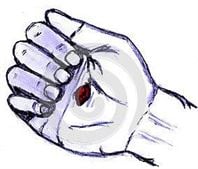
Suppurating: a wound full of pus
Sore: painful inflammation
Three famous surgeons were brought in from Madras. After holding a consultation they decided to operate. The operation took place.
The three surgeons who performed it came out of the theatre and announced, “The operation was successful. The Maharaja is dead.”
In this manner the hundredth tiger took its final revenge upon the Tiger King.
Question and answers -
1. The story is a satire on the conceit of those in power. How does the author employ the literary device of dramatic irony in the story?
A.The king was full of pride. He thought he could achieve anything, even overpower death. He tried to prove the predictions of the royal astrologer as false. He had predicted death for the king by a tiger. As the king killed one, he cautioned him against the hundredth tiger that he came across.
Ironically, the king killed the hundredth tiger also and overpowered death but as it was destined to be, the tiger escaped the bullet miraculously. He had killed ferocious tigers of flesh and blood but his satirical death came by a wooden toy tiger which he had got as a birthday gift for his son. A tiny piece of wood from the toy wounded the tiger king’s hand and finally killed him. This was an unexpected end of the mighty maharaja ‘the tiger king’.
2. What is the author’s indirect comment on subjecting innocent animals to the willfulness of human beings?
A. The author is indicating that the king being mighty, killed so many innocent animals merely to prove the astrologer wrong or to overcome his fear without realizing the severity of his actions. He did not accept destiny which has its own ways as death struck upon him by a lifeless, wooden tiger.
3. How would you describe the behaviour of the Maharaja’s minions towards him? Do you find them truly sincere towards him or are they driven by fear when they obey him? Do we find a similarity in today’s political order?
A. The king’s minions feared him and tried to please him. They wanted to keep him happy and so, spoke what was pleasing to the king’s ears.
The astrologer was initially reluctant to predict the king’s future. It was when the king asked him ‘to speak without fear’ that he spoke.
The minister did not advise the king not to kill so many innocent animals; rather he searched for a kingdom with a high population of tigers for the king to kill.
The royal hunters did not inform the king about the hundredth tiger being alive as they feared losing their job.
The shopkeeper sold the toy tiger to the king at a high price because he feared punishment.
In today’s political order also, we can see that the people who are in subordination try to please their seniors in order to retain their positions.



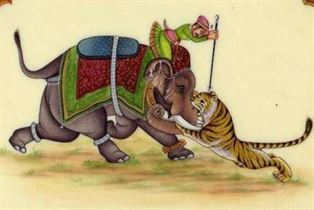


Comments
Post a Comment